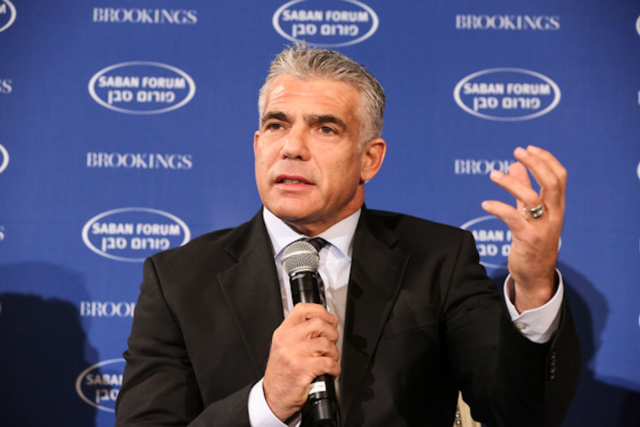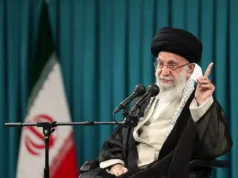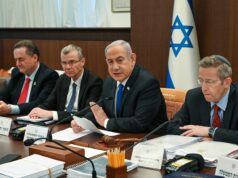Israel’s Foreign Minister Yair Lapid is arriving in Washington for talks with a wide range of American political figures and establishments. But most important is likely to be his peer-to-peer meetings with counterpart Secretary of State Antony Blinken. The last such meeting took place in May, at the end of the Hamas rocket war against Israel, abetted by intense incitement to anti-Israel violence by the Palestinian Authority (PA). That meeting, between Secretary of State Antony Blinken and PM/FM Benjamin Netanyahu, was itself cordial, but it laid out a wide gulf in the priorities of the two countries — and that gulf remains for FM Lapid.
Blinken laid out four priorities for the Biden administration:
- “To demonstrate the commitment of the U.S. to Israel’s security.”
- “To start to work toward greater stability and reduce tensions in the West Bank and Jerusalem.”
- “To support urgent humanitarian and reconstruction assistance for Gaza, to benefit the Palestinian people.”
- To continue to rebuild our relationship with the Palestinian people and the Palestinian Authority.”
Netanyahu had five:
- “I hope the U.S. will not go back to the JCPOA.”
- “To expand normalization between Israel and the Arab and the Muslim world and deepen the peace treaties that we already have.”
- “To improve the humanitarian conditions in Gaza, including the question of the return of our MIAs and two civilians.”
- “Building economic growth for Judea and Samaria, the West Bank, with international cooperation and participation.”
- “Peace itself with the Palestinians, a formal peace… Biden was absolutely correct when he said you’re not going to get peace until Israel is recognized as an independent Jewish state.”
The Biden administration had the Palestinians at the center: the “peace process,” the “two-state solution,” reopening the U.S. consulate in Jerusalem for Palestinians, and restoration of U.S. funds to the PA despite the language of the U.S. Taylor Force Act were at the top of the list. And Israel’s job was to facilitate those things. The whole list of American goodies delivered to the PA is huge and financially rewarding to an authority known not only for its financial corruption but its crackdown on human rights and protests that include the killing of protest organizer Nizar Banat.
Israel has Iran at the center: rejecting the JCPOA and stressing the Abraham Accords as the way forward for the region.
![]()
This meeting is unlikely to be as cordial as the Blinken/Netanyahu meeting precisely because Israel’s priority has been slipping away for Biden & Co. While the president (and Blinken) continue to talk a pretty good game on Iranian nuclear capability, its actions have had the opposite effect: delisting the Iranian proxy Houthis from the terror list and failing to condemn Houthi rocket attacks against Saudi Arabia — even as the U.S. pulled its air defenses from the Kingdom; organizing funds for Iran by, among other actions, allowing it access to money frozen after Tehran hijacked a South Korean ship and held its sailors for ransom; removing sanctions from two Iranian missile producers; providing financial aid to Iranian proxy Hezb’allah as it plunders Lebanon; pulling U.S. air defenses from Jordan, shaking the King, and probably accounting for Jordanian overtures to Syria and Iran; and making direct overtures to Iranian proxy and war criminal Bashar Assad.
Deputy Assistant Secretary of State Hady Amr bewailed the state of the population of Gaza without reference to its control by Iranian proxy Hamas, or the fact that Hamas locates its terror infrastructure within Palestinian towns and villages and fires on Israel from within its civilian population (a double war crime). Amr asked Israel to “collaborate” on aid without referring to Israel’s demand that two Israeli civilians and the bodies of two soldiers be released by Hamas.
If the Biden administration really wants to focus on Palestinians and the place of Arabs and Israelis — Jews, Muslims, Christians, and Druze, all citizens of a democratic state — it could do worse than look for a recent precedent.
The prior administration invited the Palestinians to the table if they met five basic requirements, respect for human rights; financial and political transparency; the end of incitement against Israel; halting financial compensation to terrorists; and eliminating Hamas and Palestinian Islamic Jihad.
It is a low bar, but it would put Secretary Blinken and FM Lapid on the same page, which would be better than where they are now, and allow for focus on the regional threats posed by Iran.






